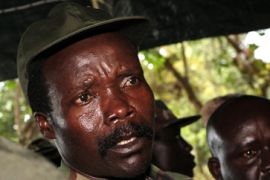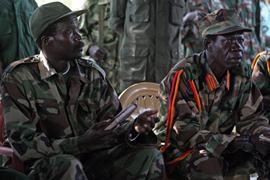Uganda rebel leader on the ropes
Kony still wants ICC warrants dropped, but can he survive if he goes on fighting?

 |
| Some of the people that have been displaced by the 21-year rebellion [GALLO/GETTY] |
Last Saturday, the Ugandan government and rebels of the Lord’s Resistance Army (LRA) signed the latest in a series of documents that could pave the way for a lasting peace agreement.
Negotiations have been on and off and sometimes both parties have had to leave the venue of the talks in the southern Sudanese city of Juba with little hope of ever reaching an agreement.
Backed for many years by the Sudanese government, the LRA seemed determined to hold out against the Ugandan government’s military, which has fought them for the past 21 years.
The LRA never scored real military victories. The trick was to rape, murder and mutilate people and make the government appear incompetent in protecting citizens from them. This the LRA seemed to be doing with staggering success.
But over the years, the rebel army has been weakened by a major government offensive that has left several of rebel leader Joseph Kony’s top commanders killed in combat.
A series of major defeats, defections and lack of support among people in the northern districts of Gulu, Kitgum and Pader, where the LRA has murdered hundreds and displaced millions, has left the rebel army with no option but to enter into peace talks.
ICC warrants
But the sticking point is that Kony, a reclusive former catechist, is still wanted by the International Criminal Court (ICC) for the murder of the people of northern Uganda. Can he survive if he holds out?
He is said to be hiding in the forests of the Democratic Republic of Congo and says he will come out only if the arrest warrants are dropped. The LRA delegation wants their man to be tried by Ugandan courts for the crimes he has committed.
On this issue, the Ugandan government seems ready to budge, but it is far from clear whether an assurance that Kony will be tried by Ugandan courts will make him renounce the rebellion.
For its part, the ICC has kept a low profile as the negotiations move slowly forwards. Human rights organisations, such as Human Rights Watch, have welcomed the warrants and it remains to be seen whether they will be dropped.
Kony’s other demands have also been rejected by the government, which considers them unreasonable. He, for example, wants 35 per cent representation in the cabinet, security agencies, government departments, diplomatic service and statutory institutions.
Government’s refusal
 |
|
Joseph Kony, left, with his commander |
The LRA also wants 35 per cent of all government contracts to go to companies owned or controlled by people from northern or north-eastern Uganda.
The government has been reluctant to grant these demands for several reasons. First, there already are cabinet ministers from the region that the LRA says is politically marginalised.
Second, Kony, a semi-illiterate rebel soldier, is represented at the talks by a few self-seeking individuals who seem to think that if he drives a hard bargain, he could get what he wants.
Third, the government is convinced that in the event that the talks fail and Kony decides to press ahead with the armed rebellion, he has slim chances of succeeding. It has always been a rag-tag army, but the LRA is now in a weaker position – with no armaments.
The LRA enjoyed the support of the Sudanese government when the Uganda government was at loggerheads with Khartoum. Sudan backed the LRA because the Ugandan government supported the Sudanese People’s Liberation Army (SPLA).
Comprehensive agreement
But in January 2005, the Comprehensive Peace Agreement (CPA) brought the war between the Sudanese government and the SPLA to an end. In southern Sudan, where Kony used to retreat whenever he suffered defeats in northern Uganda, he cannot go. Sudan is governed in the north by Omar al-Bashir and in the south by Salva Kiir of the SPLM.
That leaves Kony with one option of seeking sanctuary in the Democratic Republic of Congo (DRC), where he is holed up. But launching attacks in Uganda from the DRC is hard. The people in western Uganda, which shares a border with the DRC, are not ready to entertain new rebels in their areas, having suffered at the hands of the Allied Democratic Forces (ADF), which the Ugandan government has defeated.
Kony’s rebels can still regroup and continue to kill, rape and mutilate civilians. But with many of his senior commanders killed and the rebel force decimated, carrying on may mean he is putting his own life at great risk.
It will also be hard for him to cross back to the districts where he used to have bases as government troops are monitoring the movements of what remains of his rebels. There are steep odds stacked against him and it is hard to see how he can survive if peace talks fail.